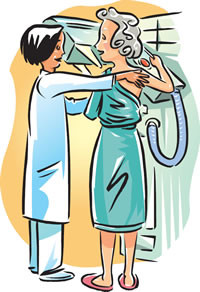
5 timeless habits for better health

What are the symptoms of prostate cancer?

Is your breakfast cereal healthy?

When pain signals an emergency: Symptoms you should never ignore

Does exercise give you energy?

Acupuncture for pain relief: How it works and what to expect

How to avoid jet lag: Tips for staying alert when you travel

Biofeedback therapy: How it works and how it can help relieve pain

Best vitamins and minerals for energy

Should you take probiotics with antibiotics?
Cancer Archive
Articles
Prostate cancer: Treat or wait?
Choosing active surveillance for prostate cancer depends on carefully weighing medical as well as personal factors. Image: Thinkstock |
An approach called active surveillance allows some men with low-risk cancer to delay the decision to treat.
Ask the doctor: Prostate surgery and ED
Q. I am scheduled to have my prostate removed and am concerned about the risk of erectile dysfunction (ED) after the surgery. I've heard that taking an ED drug daily during my recovery could help. Do you recommend this?
A. About half of men lose some erectile function after radical prostatectomy, which removes the entire prostate gland. ED drugs help men to have erections after surgery, but so far research has not shown that taking it daily produces better results than taking the medication as-needed—when you anticipate sexual activity.
Switching to a fiber-rich diet may lower colon cancer risk in blacks
Switching from a “Western” diet with lots of fat and meat to a fiber-rich diet for just two weeks makes conditions in the large intestine less favorable to the development of colon cancer. The opposite switch may promote the formation of cancer. That’s the conclusion from a small but elegant study done in urban Pittsburgh and rural KwaZulu-Natal, South Africa. In the study, 20 volunteers from each area switched diets. For two weeks, the Americans ate a traditional high-fiber African diet rich in fruits, vegetables, nuts, and beans, while the Africans ate a Western diet with more fat, protein, and meat. In just two weeks, significant changes occurred in the lining of the colon and in its chemical and bacterial make-up in both groups, but in different directions. Those following the African diet showed improvements in colon health likely to protect against colon cancer, while those following the Western diet showed changes that could lead to colon cancer.
Hormone therapy works best when combined with radiation for locally advanced prostate cancer
Men with locally advanced prostate cancer who combine hormone therapy with a course of radiation therapy tend to live longer than men who only take hormone therapy.
Targeted prostate biopsies better at detecting dangerous cancers
Standard biopsies of the prostate gland often miss potentially aggressive prostate cancer. Adding MRI images to standard biopsies improves the detection of prostate cancer.
Vegetarian diet linked to lower colon cancer risk
Looking for ways to ward off colorectal cancer? According to a new study, a pescovegetarian diet — that’s a vegetarian diet that includes fish — was linked to a 43% reduction in the risk of developing colorectal cancer. The study, published in JAMA Internal Medicine, adds more support to the notion that something in red meat, or the way it is cooked, encourages the growth of colorectal cancer. It’s also possible that eating more plant foods provides extra beneficial nutrients such as folate, calcium, and fiber that may protect against colorectal cancer. Fish contain healthful omega-3 fats and vitamin D. Another good strategy for preventing harm from colorectal cancer, the second leading cause of cancer death in the United States? Have colonoscopies as needed.
A woman’s testosterone-based vaginal cream linked to elevated testosterone in her husband
A woman’s use of a testosterone-based vaginal cream may have contributed to a spike in her husband’s prostate-specific antigen and testosterone levels after he had his prostate removed to fight advanced prostate cancer.
Good news about early-stage breast cancer for older women
Image: Thinkstock |
Although the chance of developing breast cancer increases after age 60, the likelihood of dying from it is low.
If you're like most women, you consider the possibility of learning you have breast cancer every time you have a mammogram. But breast cancer probably doesn't seem as scary as it did when you were younger, because there has been so much good news about breast cancer in the last 20 years—improvements in mammography, advances in surgery and reconstruction, and drugs that are more effective and less toxic.
Prostate cancer in second- and third-degree relatives elevates risk
Men are at greater risk for developing prostate cancer if their fathers or brothers also developed the disease. A new study shows that having second- or third-degree relatives with the disease also increases a man’s risk.

5 timeless habits for better health

What are the symptoms of prostate cancer?

Is your breakfast cereal healthy?

When pain signals an emergency: Symptoms you should never ignore

Does exercise give you energy?

Acupuncture for pain relief: How it works and what to expect

How to avoid jet lag: Tips for staying alert when you travel

Biofeedback therapy: How it works and how it can help relieve pain

Best vitamins and minerals for energy

Should you take probiotics with antibiotics?
Free Healthbeat Signup
Get the latest in health news delivered to your inbox!
Sign Up






